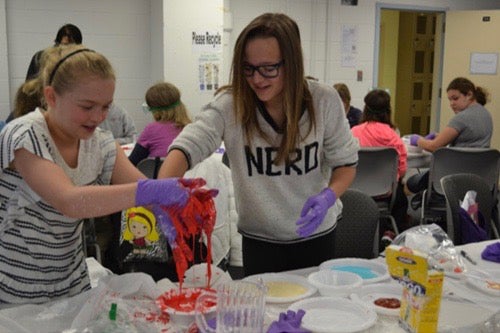KINGSTON, R.I. – April 1, 2019 – Instead of taking a break from learning, 40 middle school girls from around Rhode Island will spend public school vacation week at the University Rhode Island April 15 through 19 to take part in Chemistry Camp, a program designed to boost girls’ interest in science
This is the seventh year Chemistry Professor Mindy Levine has hosted the camp, one of her first efforts to change statistics that show girls losing interest in science during the middle-school years. Those attitudes play out in the long run. Nationally, women earn about 57 percent of all bachelor’s degrees and just over half of all science and engineering bachelor’s degrees, but remain underrepresented in science, technology, engineering and mathematics professions.
In launching the week-long, free camp, Levine researched the best age group for making a difference in girls’ passion for science. It was pretty clear. In middle school, girls’ attitudes are already being cemented, she says.
To turn the tide, she wanted to create a program that gives girls the freedom to be inquisitive and outspoken, while also getting the attention they need, says Levine, whose commitment to empowering girls in science includes Sugar Science Day for high school girls held in February at URI and numerous other outreach programs.
“I thought if we could target girls at this crucial age and give them a week of positive pro-girl, pro-science, hands-on excitement,” says Levine, “then we really could affect their attitudes in a meaningful way.”
The formula has been a success. Each year, the camp has filled all its openings and started a wait list of hopefuls for the following year. Also, some girls who have taken part in Chemistry Camp have returned for Sugar Science Day as high schoolers, Levine says. (This year’s camp is also full. To be added to a wait list for next year, go to the Chemistry Camp web page.)
Chemistry Camp, funded through the Pfizer community grants program, offers many of the things experts recommend to boost girls’ interest in science – plenty of hands-on experience, role models and encouragement. Each day features a mix of fun interactive experiments, guest scientists, and field trips – including dissecting squid at Mystic Aquarium and conducting water testing during a tour of the Narragansett Bay Commission water treatment plant in Providence.
And the week’s experiments would tax any cleanup crew. The middle schoolers, grades six through eight, will build and launch their own rockets, fashioning fuel to generate liftoff from sugar and potassium nitrate. They’ll concoct their own slime, testing ingredient ratios to make the stretchiest and stickiest slime. They’ll also create oobleck – a liquid from water and corn starch that becomes a solid under pressure – to fill a kiddy pool and take turns running across it.
The girls will be doing more than just following recipes. Middle schoolers, Levine says, are the right age to move beyond “cookbook” science and into understanding how and why an experiment works. “We do soda candy explosions,” she says, “and we test which candy will create the biggest explosion and capture that in a balloon with all that air that’s generated from it.”
Teresa Mako, a fourth-year graduate student in chemistry, is one of a half-dozen of Levine’s graduate students who help lead the camp. The Deerfield, Mass., resident, says she enjoys being a part of the camp, especially helping on field trips to expose the girls to science beyond chemistry.
“I guess the main reason I like helping out is there still is a stigma against women in the sciences,” she says. “By building a basis from the beginning that women in science is normal and that we can do everything that men can do, we will get to more of an equal footing overtime.”
Joanie Racicot, of Worcester, Mass., a second-year graduate student in chemistry, looks forward to helping out for a couple of reasons. “You get a break from being in the lab all day,” she says. “You get to do these fun science experiments with the kids and you get to be a kid for a week.”
Also, her father, Rob, a chemistry professor at Worcester State University, is one of the guest scientists, and puts on a chemistry demonstration that feels something like a magic show.
“It’s a show that he put on for me and my brother while we were growing up,” says Racicot. “He’s been telling me my whole life that science is cool and it’s all around us. I think it’s important that especially young girls have that in their life, someone telling them you can do this and science is important and fun.”
Chemistry Camp runs 9 a.m. to 4 p.m. each day, April 15 through 19, in the Multicultural Student Services Center, 74 Lower College Road, on the Kingston Campus. Media are encouraged to visit the camp on Thursday afternoon from 1 to 3 p.m. when students will build their own rockets, or Friday afternoon from 2 to 4 p.m. when experiments with oobleck will take place.

